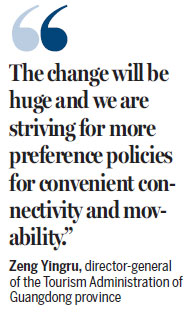Making Greater Bay Area a world tourism magnet

Closer cooperation and flexible policies on the cards to bring more tourists to region: Experts
Guangdong, Hong Kong and Macao in southern China are coordinating their policies, measures and programs to turn the Greater Bay Area into a world-class tourism attraction, according to industry experts and leading officials at a roundtable forum in Macao on Tuesday.
The city cluster in the Guangdong-Hong Kong-Macao Greater Bay Area covers nine cities of the province, including Guangzhou and Shenzhen, as well as the special administrative regions of Hong Kong and Macao.
Compared with other major bay economy regions in the world, one unique feature of the Greater Bay Area is it has two systems in three regions, Bao Jigang, director of the Monitor Center for UNWTO Sustainable Tourism Observatories, told the China Daily Roundtable Forum themed "The Greater Bay Area - Visionary Collaboration in the Making" during the Global Tourism Economy Forum.
Bao, also director of the School of Tourism Management of Sun Yat-sen University, said that on one side, it is an advantage because it provides more diversified tourism resources, but on the other, there are also barriers, such as customs clearance.

As the nation has committed itself to improve transportation in the area, or "hardware-connection" in his words, he believes it is for the "soft-connection" needs to have more attention now in building up a better future.
Jia Yucheng, deputy director of the Department of Planning and Finance at China National Tourism Administration, expressed the central government's support for the Greater Bay Area's development in detail.
Jia said it will further facilitate the area's tourism services, such as introducing a 144-hour easy visa policy, promoting the region's upgrading of the sector, including varied products such as multiple destinations for one journey, and strengthening their coordination in smoothening market operations and protecting industrial order.
Maria Helena de Senna Fernandes, director of the Macao Government Tourism Office, agreed that the three regions "should work together to make the local tourism market's cake bigger".
For example, she said new transportation projects, including the Hong Kong-Zhuhai-Macao Bridge, will also become tourism sights, and the three regions should work together to plan sightseeing routes for the bridge. The bridge, which is expected to be completed by the end of this year, will shorten the current four-hour drive from Hong Kong to Zhuhai to half an hour.
Cathy Chu, commissioner for the Hong Kong Tourism Commission, noted: "Regional cooperation is not simply a combination of each other's advantages." She said the area should come up with "a story of the Greater Bay" as a whole to jointly attract tourists.
Zeng Yingru, director-general of the Tourism Administration of Guangdong province, said they are already researching and studying together with institutions and governments in Hong Kong and Macao about the influence these transportation systems will bring to the area's tourist market.
"The change will be huge and we are striving for more preference policies for convenient connectivity and movability," she said.
Sio Chi-wai, president of the Macau Development Strategy Research Centre, agreed that the future development of the Greater Bay Area should be driven by multiple industry leaders in the area, instead of one.
From the economic perspective, such "soft-connection" can be regarded as a management mechanism, said Song Haiyan, president of the International Association for Tourism Economics.
Song, associate dean and chair professor of School of Hotel and Tourism Management at the Hong Kong Polytechnic University, suggested that local governments in the Greater Bay Area should adopt an organic cooperation method which puts their collaboration on the foundation of strategic agreements, but does not have a central management institution. It is a much more feasible approach for now, he said.
grace@chinadailyhk.com
| Posing for a group photo at the China Daily Roundtable Forum on “The Greater Bay Area — Visionary Collaboration in the Making” — held in conjunction with the Global Tourism Economy Forum in Macao on Tuesday — are (from left) moderator and Deputy Editor-in-Chief of China Daily Asia Pacifi c Wen Zongduo; Director of Monitoring Center for UNWTO Sustainable Tourism Observatories Bao Jigang; Commissioner for Tourism at the Hong Kong Tourism Commission Cathy Chu; Deputy Director of Planning and Finance Department at China National Tourism Jia Yucheng; Director-General of Tourism Administration of Guangdong province Zeng Yingru; Director of Macao Government Tourism O ce Maria Helena de Senna Fernandes; Associate Dean and Chair Professor of the School of Hotel and Tourism Management at Hong Kong Polytechnic University Song Haiyan; and President of Macau Development Strategy Research Centre Sio Chi-wai. Photos By Parker Zheng / China Daily |
(HK Edition 10/18/2017 page14)
MOST POPULAR
- 1 China to give visa-free treatment to another 9 countries
- 2 China fully opens manufacturing sector to foreign investors in landmark opening up move
- 3 China's import expo attracts record-breaking participating countries, exhibitors
- 4 China's door opening even wider to foreign visitors, businesses
- 5 China revises rules to ease foreign strategic investment in listed firms
Editors' Picks
 Video:
Peru sees new port open
Video:
Peru sees new port open
 Infographic:
China's public holidays for 2025
Infographic:
China's public holidays for 2025
 Infographic:
Basic facts of APEC
Infographic:
Basic facts of APEC
 Infographic:
Wrapping up the 7th CIIE: Data recap
Infographic:
Wrapping up the 7th CIIE: Data recap




